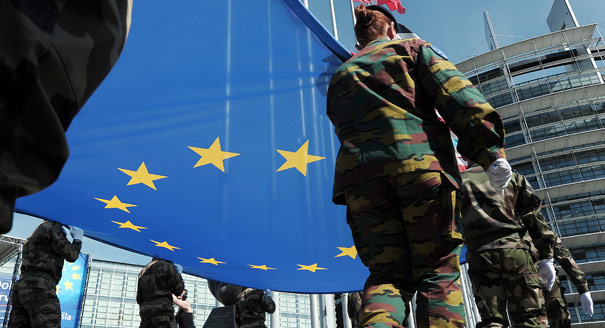Judy Dempsey
{
"authors": [
"Judy Dempsey"
],
"type": "commentary",
"blog": "Strategic Europe",
"centerAffiliationAll": "",
"centers": [
"Carnegie Endowment for International Peace",
"Carnegie Europe"
],
"collections": [
"Transatlantic Cooperation"
],
"englishNewsletterAll": "",
"nonEnglishNewsletterAll": "",
"primaryCenter": "Carnegie Europe",
"programAffiliation": "",
"programs": [],
"projects": [],
"regions": [
"Europe",
"Eastern Europe",
"Western Europe"
],
"topics": [
"Security",
"Military",
"EU"
]
}
Source: Getty
Time to End the EU-NATO Standoff
Despite the serious implications of the Ukraine crisis, Cyprus and Turkey have imposed persistent obstacles to EU-NATO cooperation. It is time to break the deadlock.
The standoff between NATO and the European Union is one of the most debilitating and shortsighted disputes between the two organizations, whose headquarters are but a twenty-minute bus ride from each other in Brussels.
The uneasy situation has been going on ever since Cyprus joined the EU on May 1, 2004. It is absurd, dangerous, and costly for both the EU and NATO.
The two organizations cannot openly discuss security and intelligence issues. Nor can they cooperate by pooling their hard- and soft-power attributes, as the standoff means that the EU and NATO cannot exploit the Berlin Plus arrangements for sharing assets. That hinders both organizations’ thinking about any long-term strategic cooperation. It is time for the standoff to end.
Times were different back then. The level of trust between the two organizations was so low it was surprising that Berlin Plus was agreed to at all.
The EU and NATO had both become bitterly divided over the U.S.-led invasion of Iraq in 2003. France, Germany, Belgium, and Luxembourg (along with Russia) had opposed the invasion and had vetoed any NATO support for it. These countries also believed that the EU could go it alone by setting up its own military planning headquarters while the Europeans beefed up their own defense capabilities.
The reality was—and still is—that Europe cannot go it alone. It lacks the military capabilities and the political will to take on more of the burden sharing that the United States has long been asking of its European allies.
The United States and the Atlanticist members of the EU were staunchly against the Franco-German plan for an EU military planning headquarters. They did not relish the idea of France and Germany, then under the Social Democrat and pro-Russian chancellor Gerhard Schröder, setting up European defense structures that would be not only independent from NATO but also competing with it—and hence with the United States.
Such competition would have been a coup for Russia, which has long worked for the decoupling of the transatlantic relationship.
Much has changed in that relationship over the past decade, and in Europe’s relations with Russia. If anything, the Ukraine crisis should surely be the catalyst for the EU and NATO to reinforce the ties between them by finding ways to complement each other’s strengths. If only that were the case.
Despite the Ukraine crisis, Cyprus and Turkey undermine #EU-#NATO cooperation.Tweet This
Even though the EU and NATO together understand the enormity of the Ukraine crisis and its implications for both organizations, Cyprus and Turkey are undermining EU-NATO cooperation. Both countries are using the division of Cyprus, whose northern part Turkey invaded forty years ago, as a bargaining chip in NATO and the EU.
In doing so, the two states hinder the ability of the union and of the alliance to complement their military and civilian capabilities. Cyprus, a member of the EU but not of NATO, and Turkey, a member of NATO but not of the EU, are jeopardizing a rare opportunity for hard and soft power to cooperate.
Not only has Cyprus done much to prevent the EU from working more closely with NATO. It has also done everything possible to block the European Commission from opening more chapters of Turkey’s EU accession negotiations. In short, EU-NATO relations have been held hostage to Cyprus ever since this divided island joined the EU in 2004.
Turkey isn’t blameless either. It has frequently thwarted NATO’s attempts to work with the EU. Since 2003, there have been only two EU missions that could call on Berlin Plus, in Bosnia and Herzegovina and in Macedonia.
What this means in practice is that Cyprus can block any EU proposal to use Berlin Plus, while Turkey can block the provision of NATO assets to the EU.
Successive NATO secretaries-general and EU foreign policy chiefs have tried to find ways to circumvent the Cypriot and Turkish obstacles, with limited results. Now, with new leaders heading all the EU institutions and NATO, there could be a chance to break this deadlock.
With new EU and NATO leaders, there could be a chance to break the deadlock.Tweet This
NATO has a new secretary general, Jens Stoltenberg. Federica Mogherini is the recently installed head of the European External Action Service. Donald Tusk has become the president of the European Council, which represents EU leaders. And the president of the European Commission is new, too: Jean-Claude Juncker.
All four could spell out to Cyprus and Turkey what is at stake in this debilitating standoff. The Ukraine crisis makes closer cooperation between NATO and the EU all the more necessary.
It is not only about improving the EU’s security and the stability of its Eastern neighbors. It is also about sharing increasingly scarce military and civilian capabilities at a time when the tools of hard and soft power are needed more than ever.
About the Author

Nonresident Senior Fellow, Carnegie Europe
Dempsey is a nonresident senior fellow at Carnegie Europe
- Europe Needs to Hear What America is SayingCommentary
- Babiš’s Victory in Czechia Is Not a Turning Point for European PopulistsCommentary
Judy Dempsey
Recent Work
Carnegie does not take institutional positions on public policy issues; the views represented herein are those of the author(s) and do not necessarily reflect the views of Carnegie, its staff, or its trustees.
More Work from Strategic Europe
- Taking the Pulse: Can European Defense Survive the Death of FCAS?Commentary
France and Germany’s failure to agree on the Future Combat Air System (FCAS) raises questions about European defense. Amid industrial rivalries and competing strategic cultures, what does the future of European military industrial projects look like?
Rym Momtaz, ed.
- Macron Makes France a Great Middle PowerCommentary
France has stopped clinging to notions of being a great power and is embracing the middle power moment. But Emmanuel Macron has his work cut out if he is to secure his country’s global standing before his term in office ends.
Rym Momtaz
- How Europe Can Survive the AI Labor TransitionCommentary
Integrating AI into the workplace will increase job insecurity, fundamentally reshaping labor markets. To anticipate and manage this transition, the EU must build public trust, provide training infrastructures, and establish social protections.
Amanda Coakley
- Can Europe Still Matter in Syria?Commentary
Europe’s interests in Syria extend beyond migration management, yet the EU trails behind other players in the country’s post-Assad reconstruction. To boost its influence in Damascus, the union must upgrade its commitment to ensuring regional stability.
Bianka Speidl, Hanga Horváth-Sántha
- Taking the Pulse: Can the EU Attract Foreign Investment and Reduce Dependencies?Commentary
EU member states clash over how to boost the union’s competitiveness: Some want to favor European industries in public procurement, while others worry this could deter foreign investment. So, can the EU simultaneously attract global capital and reduce dependencies?
Rym Momtaz, ed.









